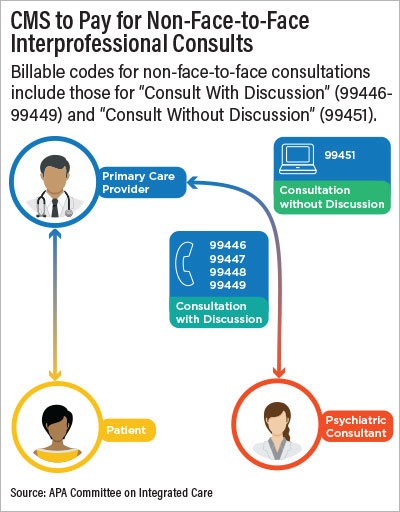Integrated Care Committee Provides Guides to Interprofessional Consultation Codes
Abstract
Medicare now pays for non-face-to-face interprofessional “curbside” consultations by psychiatrists with primary care and other physicians. The psychiatrist guide explains how to use the codes, and the patient guide explains how they are important for care.
A guide for psychiatrists on how to use CPT codes to bill for non-face-to-face consultations with primary care and other physicians—along with a one-page guide on the consultation and billing process for patients—is now available from APA’s Committee on Integrated Care.
The guides refer to the kind of non-face-to-face “curbside” consultations that many psychiatrists regularly provide—answers to impromptu requests from primary care and other physicians for advice about managing psychiatric conditions or possible psychiatric complications related to medical treatment. The Centers for Medicare and Medicaid Services (CMS) issued the codes in 2019 and began paying for the consults this year.

“Payment for Non-Face-to-Face Services: A Guide for the Psychiatric Consultant” is a four-page how-to guide for using CPT codes that psychiatrists can use to bill for interprofessional consultations using telephone, internet, or electronic health records. The codes explained in the new guide are 99446-99449 (Consult With Discussion) and 99451 (Consult Without Discussion).
Psychiatrists should note, however, that these codes cannot be used by those who are working in a collaborative care model; their time is billed by the primary care practice using codes 99492-99494.
“The CPT code book can be wordy, confusing, and overwhelming,” said Shannon Kinnan, M.D., a member of the committee who helped draft the guides. “We wanted to break it down in an easy-to-use guide so psychiatrists who are consulting with primary care and other physicians will know how they can bill for their services, and patients can understand why the consultation is an important part of their care.”
The guide for psychiatrists describes each set of codes and the circumstances in which they can be used, recommendations for documentation, and time guidelines and approximate reimbursement for each amount of time spent in consultation. The guide also provides two case examples, including a patient scenario presented by a primary care or other physician, the response by the consulting psychiatrist, and how the response is documented and billed.
“Consult With Discussion” (99446-99449) codes are codes that can be used when at least 50% of the time devoted to consultative discussion with the requesting primary care professional is carried out in verbal or online discussion, in which the psychiatrist provides both a written and a verbal report to the requesting physician. (The consult with discussion codes do not include any time spent communicating with the patient and/or family.)
The 99451 “Consult Without Discussion” code is used when five minutes or more are spent using an electronic health record system, internet, or fax to consult with a physician. Only a written report to the treating/requesting physician is required.
Each of the codes is associated with an increment of time spent in consultation. The time increments and approximate payments for each code are as follows:
Consult With Discussion
99446: 5-10 minutes ($18)
99447: 11-20 minutes ($37)
99448: 21-30 minutes ($56)
99449: 31+ minutes ($74)
Consult Without Discussion
99451: At least 5 minutes ($38)
The one-page patient information pamphlet is written in a Q and A format, answering five questions: What is an interprofessional consult? Do you see a psychiatric consultant during this type of consult? Why not see a psychiatric consultant in person? Are these types of consults common in other medical specialties? Will I receive a bill for this type of consult?
Both guides are posted on the APA website and are being disseminated through the Committee on Integrated Care’s listserv. Psychiatrists are urged to share the patient guide with primary care physicians, who can provide it to their patients.
“E-consults and curbside consults help primary care providers to better care for their patients and take a fraction of the time of a formal psychiatric intake,” Kinnan told Psychiatric News. “We hope the guides make the codes for these services easier to use and help promote this kind of collaboration among physicians.” ■
The clinician guide to interprofessional consultation codes and the patient information pamphlet are posted here.



